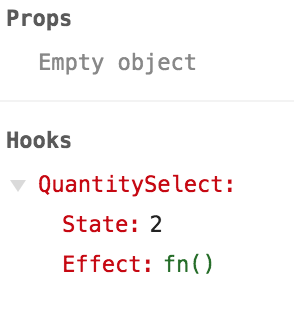function QuantitySelector() {
return (
<div>
<button onClick={() => null}>-</button>
<input type="number" value={"1"} />
<button onClick={() => null}>+</button>
</div>
);
}❌ We would like our QuantitySelector component to ... work. Unfortunately, function components don't provide access to state or lifecycle methods.
class QuantitySelector extends React.Component {
constructor(props) {
super(props);
this.state = {
quantity: 1
};
}
render() {
return (
<div>
<button onClick={() => null}>-</button>
<input type="number" value={"1"} />
<button onClick={() => null}>+</button>
</div>
);
}
}[.code-highlight: all]
[.code-highlight: 4-9]
[.code-highlight: 12-22]
[.code-highlight: 27-29]
[.code-highlight: all]
class QuantitySelector extends Component {
constructor(props) {
super(props);
this.state = {
quantity: 1
};
this.incrementQuantity = this.incrementQuantity.bind(this);
this.decrementQuantity = this.decrementQuantity.bind(this);
}
incrementQuantity() {
this.setState(state => ({
quantity: state.quantity + 1
}));
}
decrementQuantity() {
this.setState(state => ({
quantity: state.quantity - 1
}));
}
render() {
return (
<div>
<button onClick={this.decrementQuantity}>-</button>
<input type="number" readOnly value={this.state.quantity} />
<button onClick={this.incrementQuantity}>+</button>
</div>
);
}
}Classes Considered Harmful
[.autoscale: true]
[.build-lists: true]
- Harder to test and reason about. Function components are pure and easy to test
- Tie together behaviour and display. Not easily composable
- Related code does not live together; it's dispersed across
constrcutor,componentDidMount, various handlers etc - Won't benefit from future React optimizations for function components1
[.code-highlight: 2,3]
import React, { useState } from "react";
// in the top level scope of your function component:
const stateObjValue, setStateObjValue = useState(initialValue);[.code-highlight: 3,4]
import React, { useState } from "react";
const [stateObjValue, setStateObjValue] = useState(initialValue);
// curr value -⬆️[.code-highlight: 3,4]
import React, { useState } from "react";
const [stateObjValue, setStateObjValue] = useState(initialValue);
// function to update value ---⬆️[.code-highlight: 3,4]
import React, { useState } from "react";
const [stateObjValue, setStateObjValue] = useState(initialValue);
// React library function -----------------⬆️[.code-highlight: 3,4]
import React, { useState } from "react";
const [stateObjValue, setStateObjValue] = useState(initialValue);
// the initial value, can be anything ----------------⬆️ℹ️ useState allows us to use local state in a function component
Apply useState to our class based component
[.code-highlight: all]
[.code-highlight: 1,4]
[.code-highlight: 6, 7, 11, 12, 13]
[.code-highlight: all]
import React, { useState } from "react";
function QuantitySelector() {
const [quantity, setQuantity] = useState(1);
const incrementQuantity = () => setQuantity(quantity + 1);
const decrementQuantity = () => setQuantity(quantity - 1);
return (
<div>
<button onClick={() => decrementQuantity()}>-</button>
<input type="number" readOnly value={quantity} />
<button onClick={() => incrementQuantity()}>+</button>
</div>
);
}❓ What about lifecycle methods (componentDidMount)
Let us add a feature in our component to update cart (a side effect) whenever the quantity is updated
Back to a class based approach
[.code-highlight: all]
[.code-highlight: 6-12]
class QuantitySelector extends Component {
constructor(props) {
// …
}
componentDidMount() {
CartAPI.setQuantity(this.state.quantity);
}
componentDidUpdate() {
CartAPI.setQuantity(this.state.quantity);
}
incrementQuantity() {
// …
}
decrementQuantity() {
// …
}
render() {
// …
}
}💔 We need to get away from classes
[.code-highlight: 3-7]
import React, { useEffect } from "react";
// in the top level scope of your function component:
useEffect(() => {
// imperative, effectful code.
// will fire on mount and after every update
};[.code-highlight: 5-7]
import React, { useEffect } from "react";
// in the top level scope of your function component:
useEffect(() => {
// will only fire when `foo` or `bar` change
}, [foo, bar]);[.code-highlight: 5-7]
import React, { useEffect } from "react";
// in the top level scope of your function component:
useEffect(() => {
// will only fire on component mount
}, []);Apply useEffect to our class based component
[.code-highlight: all]
[.code-highlight: 4-6]
function QuantitySelector() {
const [quantity, setQuantity] = useState(1);
useEffect(() => {
CartAPI.setQuantity(quantity);
}, [quantity]);
const incrementQuantity = () => setQuantity(quantity + 1);
const decrementQuantity = () => setQuantity(quantity - 1);
return (
<div>
<button onClick={() => decrementQuantity()}>-</button>
<input type="number" readOnly value={quantity} />
<button onClick={() => incrementQuantity()}>+</button>
</div>
);
}📵 Time to get freaky
Let's consolidate our behaviour into a custom hook!
[.code-highlight: all]
[.code-highlight: 2]
[.code-highlight: 4-6]
[.code-highlight: 11]
[.code-highlight: all]
function useQuantitySelect(initialQuantity) {
const [quantity, setQuantity] = useState(initialQuantity);
useEffect(() => {
CartAPI.setQuantity(quantity);
}, [quantity]);
const incrementQuantity = () => setQuantity(quantity + 1);
const decrementQuantity = () => setQuantity(quantity - 1);
return { quantity, setQuantity, incrementQuantity, decrementQuantity };
}Using a custom hook
[.code-highlight: all]
[.code-highlight: 2-4]
[.code-highlight: all]
function QuantitySelector() {
const { quantity, incrementQuantity, decrementQuantity } = useQuantitySelect(
1
);
return (
<div>
<button onClick={() => decrementQuantity()}>-</button>
<input type="number" readOnly value={quantity} />
<button onClick={() => incrementQuantity()}>+</button>
</div>
);
}Returns the current value of the context.
const value = useContext(MyContext);A useful replacement for getState when the state object is complex or the logic for updating it is complex.
const [state, dispatch] = useReducer(reducer, initialArg, init);
// get values from the state
const hasDiscont = state.price.hasDiscount;
// dispatch actions
dispatch({ type: "QUANTITY/INCR", payload: 1 });Returns a memoized value. For performance optimization - think shouldComponentUpdate:
const memoizedValue = useMemo(() => computeExpensiveValue(a, b), [a, b]);Returns a memoized callback. For performance optimization - think shouldComponentUpdate:
const memoizedCallback = useCallback(() => {
doSomething(a, b);
}, [a, b]);Allows you to mutate the passed in ref object.
Useful for DOM manipulation, but it can also be used for working with any type of mutable value.
const refContainer = useRef(initialValue);💖 And many more!
[.autoscale: true]
[.build-lists: true]
Benefits of hooks:
- static typing better than higher order components
- keep related code together (eg,
componentDidMountandcomponentWillUnmount) - resue behaviour and state management
- don't need deep nesting in the component tree - less work for React to do
- no overhead of creating classes and even handler binding
- good devtools support
❔ So, what's the lowdown?
[.autoscale: true]
Code from deck
Official docs
Other links
- [Functional vs Class-Components in React](https://medium.com/@Zwenza/* functional-vs-class-components-in-react-231e3fbd7108)
- [Rangle | Refactor to React Hooks, Not Classes](https://rangle.io/blog/* refactor-to-react-hooks-not-classes/)
- [Rangle | Simplifying React Forms with Hooks](https://rangle.io/blog/* simplifying-controlled-inputs-with-hooks/)
- [State Management with React Hooks — No Redux or Context API](https://medium.com/* javascript-in-plain-english/state-management-with-react-hooks-no-redux-or-context-api-8b3035ceecf8)
- How to fetch data with React Hooks?
